Table of Contents
Every sportsperson has had that moment when on the way to training they felt that today it just won’t happen. Fatigue, zero energy, a hard day at work or just a time when you don’t feel like doing anything. In these situations a pre-workout stimulant can be a great help. Once you take it, the tables usually start to turn. New energy flows into your veins, your motivation rises and you feel like getting the most out of yourself again. How is this possible, and what do these miracle stimulants actually do to your body? We will explain all this in today’s article.
What are pre-workouts and how are they classified?
Pre-workout supplements are designed for sportspeople to energize, kick-start and enhance athletic performance. This is ensured by the functional ingredients that such a pre-workout supplement contains. [1]
Pre-workout supplements clasification
- Single component pre-workout stimulants contain one active ingredient that is supposed to help improve performance, typically it can be caffeine, NO boosters (e.g. citrulline malate), taurine, acetyl l-carnitine.
- Multicomponent – a blend of multiple active ingredients that complement each other, thus combining multiple mechanisms of action. Often they are furthermore enriched with additives supporting the absorption of individual substances (e.g. black pepper extract – bioperine).
Another type of pre-workout supplements is based on the content of the main active ingredients. In this respect, the possible content of stimulants plays a crucial role.
- Containing stimulants – these are pre-workout supplements that contain stimulants such as the popular caffeine. Those of you who are more sensitive to caffeine and other stimulants should only use such a pre-workout in the morning or early afternoon. Otherwise, they risk disrupting the quality of your sleep.
- Stimulant-free – pre-workouts that contain no stimulants. This makes them ideal before exercise in the afternoon or evening. They will not affect your quality of sleep.

What can a pre-workout stimulant do, and what can’t it do?
What you want from a pre-workout supplement is to give you an extra boost of energy before a workout and help you perform better. Many of you may have unrealistic expectations of what a pre-workout can help with. Then comes the disappointment that you don’t suddenly squat 200 kg when your current PR is 150 kg. So let’s summarise what you can expect from a pre-workout, and what is not within its power.
How can a pre-workout supplement help in sport?
1. Boosts performance and increases drive
This effect is mainly due to the contained stimulants, such as caffeine. This works on a simple principle. You have a certain level of adenosine in your body at all times to calm you down and make you feel relaxed. The closer you get to sleep, the higher your levels get. And if adenosine binds to its receptors, you start to fall asleep. Caffeine, however, has the ability to block this process by binding to its receptors instead of adenosine. Thanks to caffeine’s broad mechanism of action, which also includes its effect on catecholamines, stress response hormones, adrenaline and noradrenaline, you feel energised and invigorated to perform. And if you add your favourite music to your headphones to boost your motivation and increase your enthusiasm, you will literally break records. [2]
If you want to learn more about how caffeine affects your workout, you shouldn’t miss our article Caffeine Before a Workout: Functions, Benefits, Risks, and Dosage.
2. Improves concentration
Better concentration is primarily due to the presence of nootropics such as choline, DMAE or ALCAR (acetyl l-carnitine). These play a vital role in supporting cognitive function. However, caffeine also plays a role, as it can affect brain function, thereby influencing your memory, concentration or attention. This can be combined with l-theanine, which mitigates its sharpness and range.
If you are interested in more tips on how to improve concentration, you should not miss our article Nootropics for Improving Brain Function.
3. Increases blood circulation to the muscles
Better blood flow to the muscles or the so-called pump is mainly related to substances such as citrulline malate, arginine or nitrates (e.g. from beetroot). You can find these under the terms NO booster or NO stimulant. These work on a simple principle. They will help to increase blood circulation in your body, especially in working muscles. This allows more oxygen and other nutrients needed for improved athletic performance to reach the muscle cells. You can feel this as an influx of new energy, which can lead to better performance and subsequent more efficient recovery.
4. Promotes strength performance
The support of strength performance is again mainly due to the presence of caffeine and other functional substances in the pre-workout. To some extent, however, it can be influenced by its combination with NO boosters, which are the aforementioned substances to promote blood flow. This effective combination can make the barbell feel lighter and allow you to perform one more repetition. Citrulline malate can also help you manage a higher number of reps. [3-4]
Having the right load and number of repetitions is crucial for muscle growth and strength. How to do this, we will advise you in our article How Many Reps Should You Do If You Want to Lose Weight or Gain Muscle?
5. Increases endurance
Better endurance performance is again mainly due to the caffeine contained in the pre-workout. By its action on adenosine receptors, it can delay and dampen the feeling of fatigue. Thanks to this, you may be able to perform longer and more intensively. In addition, caffeine can also reduce the subjective intensity of the activity performed. [38]
However, long-term use of citrulline, beta alanine or BCAAs, which reduce fatigue during long endurance exercise and also serve as a source of energy, can also help. You may be surprised to know that, in addition to beta alanine, even baking soda, which you normally have in your kitchen, works to reduce muscle acidity. However, you would have to eat it regularly in a dose of a few grams, which might not be the best taste experience. [39-40]
If you want tips on other supplements to boost your endurance, you shouldn’t miss our article on 11 Best Supplements for Running, Cycling and Other Endurance Sports.
6. Helps burn more calories
A pre-workout is not some miracle supplement that will help you burn endless amounts of energy for free. But it can help to burn a few dozen extra calories. How is this possible? Well, imagine what your workout would look like on days when you don’t have the strength and feel tired. Now, compare that to a day when you take a pre-workout for a boost. In the latter case you are able to put a lot more strength into it as well as energy, lift more weight on the barbell, handle more reps or extend your endurance performance. When you add to that the metabolic acceleration due to the mechanism of action of caffeine or synephrine and the better blood flow due to NO boosters, you get even more out of it. This is also the reason why athletes often use a pre-workout supplement to help them lose weight.
If you are interested in how many calories you burn through different sports, you should not miss our article How to Lose a Kilo of Fat and How Much Energy Is Hidden in It?
7. Reduces feelings of fatigue
On the one hand, the reduction of fatigue during exercise is due to caffeine, which binds to adenosine receptors and stimulates the central nervous system. This ensures a delay and reduction in the perceived fatigue, giving you extra time to feel invigorated and work hard on your workout.
However, other substances such as acetyl l-carnitine also play a role. It passes more easily to the brain, where it can help cells use energy more effectively and make you feel more focused and less tired.
For more tips on reducing fatigue, see our article Why Are You Always Tired? The 7 Most Common Causes and Their Solutions.
8. Makes your workout feel easier
A pre-workout stimulant can help make your whole workout feel easier. By giving you energy, delaying fatigue, boosting concentration and increasing your enthusiasm, you’ll find it much easier to perform than without it. [38]
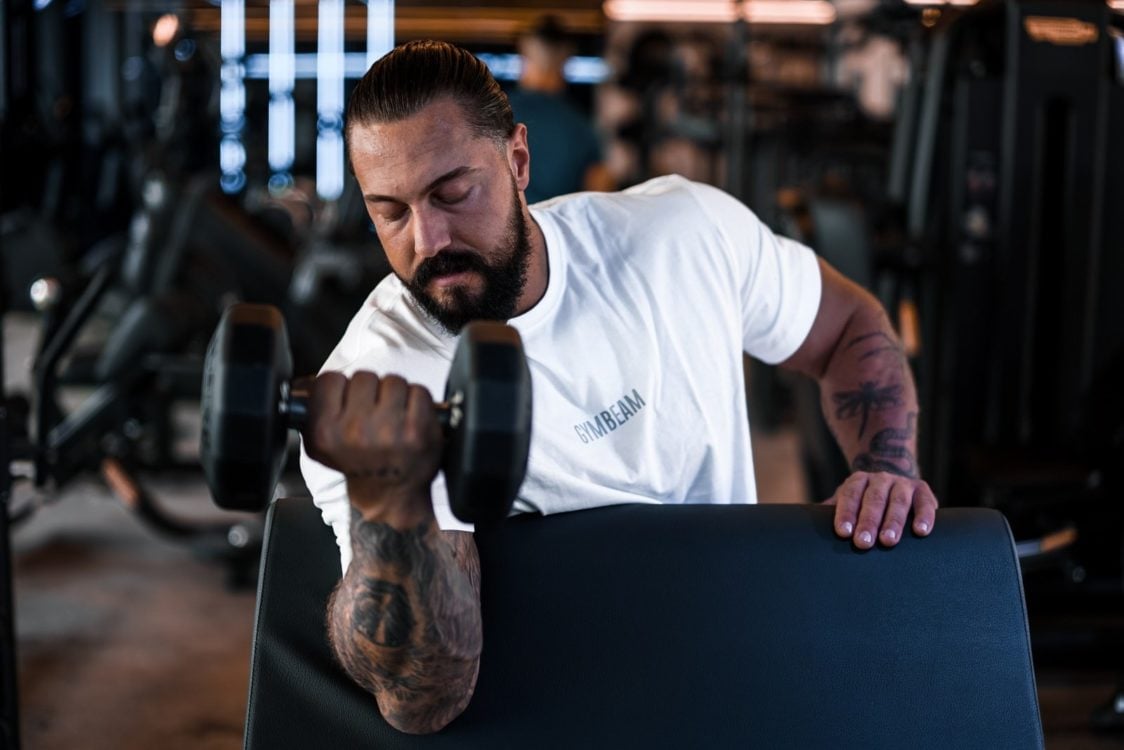
You might be interested in these products:
What pre-workout supplement cannot do during a workout?//
1. Cannot do the workout for you
While a pre-workout supplement can make your training easier and more enjoyable, don’t expect miracles. The hardest work is left to you, and you’ll still laboriously work off every kilo you lift. So think of it more as a helper who will be with you during your workout and help you “lighten the load” when you’re not feeling up to it anymore.
2. Increase performance by 100%
Again, I’ll refer to the pre-workout stimulant being a tool, not a game changer that can work miracles. But you can’t raise your performance by a few percent, no substance can do that. Unless you’ve been training far below your capabilities for a long time and suddenly give it your all. So, don’t have unrealistic demands on your pre-workout.
3. Burn hundreds of kcal without working out
It is true that a pre-workout supplement can help you burn more calories during your workout. But again, it won’t be for free. It won’t do much on its own. The key is that it will give you a burst of energy, delay fatigue and get you pumped up to perform. As a result, you’ll be able to get more energy out of your workout than without it, which means more calories burned as well. A slight boost in metabolism thanks to caffeine may also play a role. Even so, you still need to work hard. It’s not enough to take a pre-workout, sit on the weight bench and wait for a miracle.
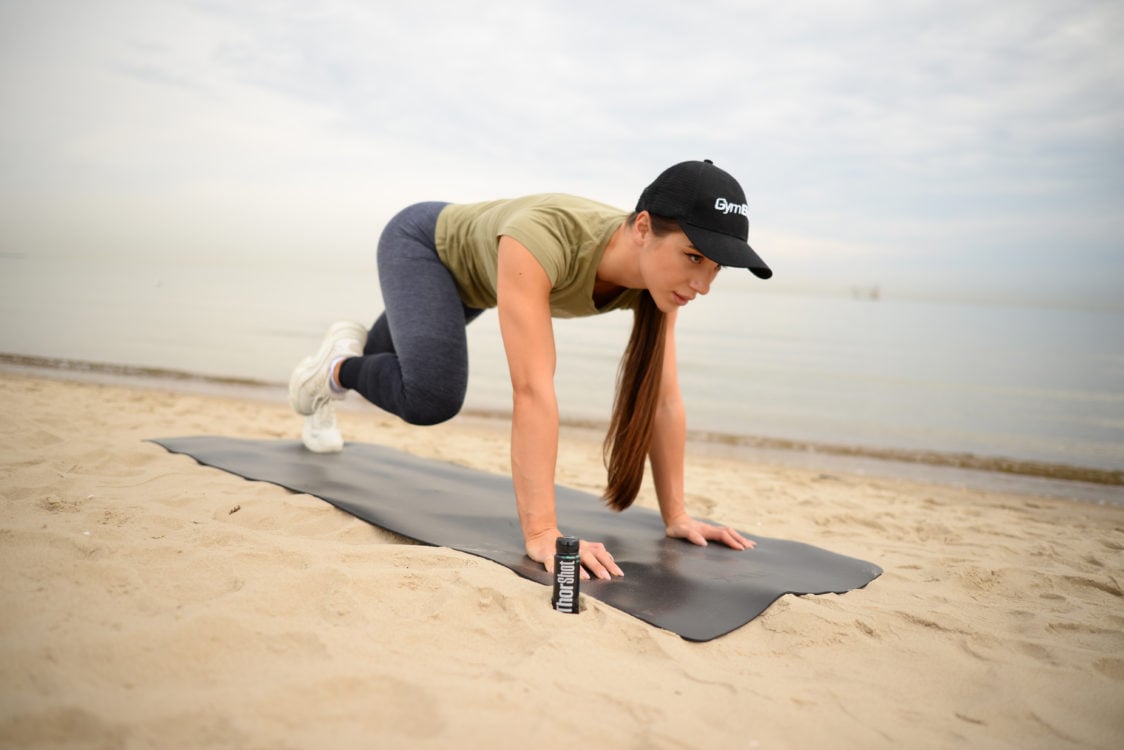
The most effective substances in pre-workout supplements
In order to get a better idea about pre-workouts, let’s take a closer look at their ingredients list. Thanks to this, you will be able to better evaluate which ingredients you would like to find in them, and which might not suit you.
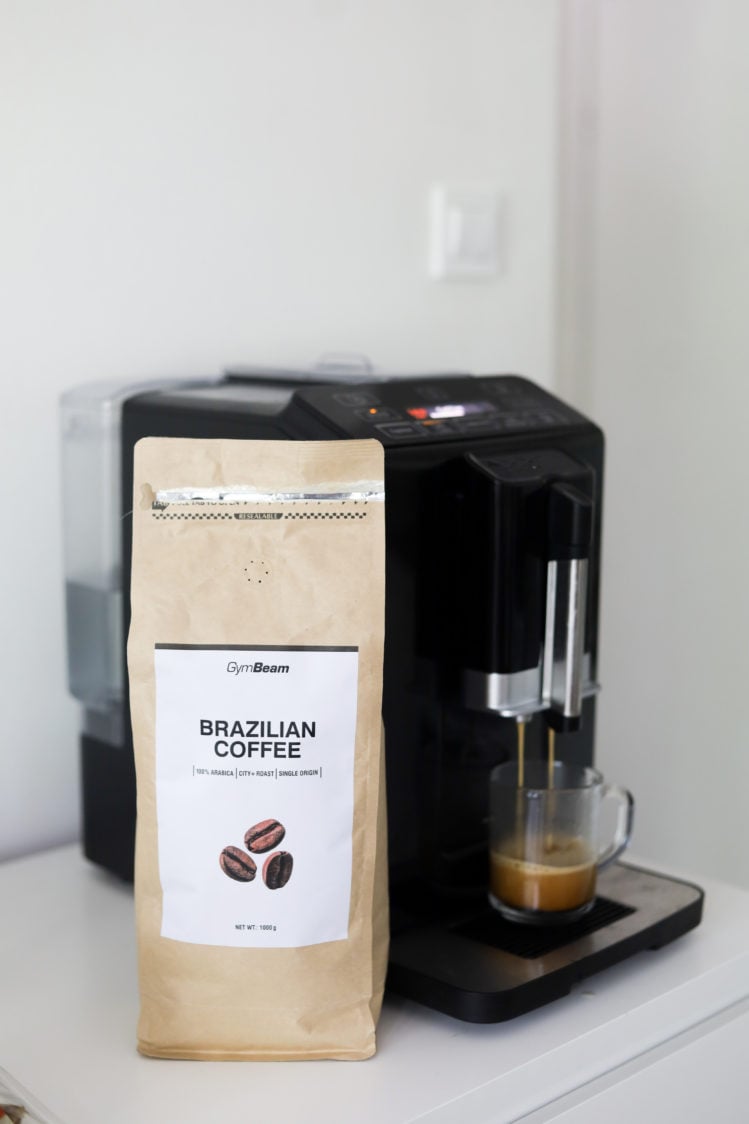
Caffeine
Caffeine is the most popular stimulant commonly found in pre-workouts worldwide.
- According to study results, caffeine can improve endurance, specifically working with amounts of 3-6 mg per kg/BW. More recently, research has focused on smaller doses of 2-3 mg/kg BW, which may work just as well.
- Other research has focused on speed in cyclists. It was found that those who consumed 200 mg of caffeine were faster compared to cyclists who only received a 100 mg dose of caffeine.
- Similarly, caffeine can also increase strength, according to study results.
- Research shows that caffeine improves physical performance in both trained and untrained individuals. [3] [5-7]
In addition, caffeine may also improve reaction time, reduce the perceived difficulty of training and pain after sport, or improve other aspects of performance. But if you choose a pre-workout with caffeine, keep in mind that it is a stimulant. For those of you who are more sensitive to it, taking such a pre-workout can be unpleasant. You may experience, for example, hot flashes, heart palpitations, dizziness and the like. Therefore, it is advisable to combine caffeine with, for example, l-theanine, which alleviates too sharp a rush and range.
In addition to caffeine itself, you can often find caffeinated plant extracts in pre-workout supplements. These include, for example, guarana or green, white or black tea. And teacrine, an alkaloid that is structurally similar to caffeine, is no exception. However, it is not nearly as well studied in comparison. [8]
What is a recommended serving amount of caffeine?
A single serving of caffeine should be around 200 mg. However, some sources also work with a dose of 3-6 mg/kg. However, you should not exceed the maximum daily recommended intake, which according to the EFSA is 400 mg for a 70 kg person.
Want to learn more about how caffeine affects your workout? Then you shouldn’t miss our article Caffeine and How It Can Enhance Your Performance.
NO boosters (arginine, citrulline malate, betaine, beetroot extract)
NO boosters, or so-called pumps, are added to pre-workouts mainly because they help increase blood flow to the muscles. The principle is quite simple. NO molecules dilate blood vessels, which causes vasodilation. This allows blood to flow better, which increases blood flow to the muscles. This leads to a better supply of oxygen and other nutrients necessary for improved athletic performance. In this regard, arginine, the amino acid citrulline on its own or bound to malate, is a great choice. The latter can then reduce the production of lactic acid, which is produced as a by-product of intense training and is associated with a reduction in performance intensity.
- The results of a study looking at the effect of citrulline on performance showed that an 8 g dose of citrulline malate before an upper body workout helped increase repetitions by almost 53%. At the same time, on the first and second day after the workout, respondents had 40% less perceived muscle soreness. However, it should also be mentioned that almost 15% of the subjects experienced nausea after taking citrulline. Therefore, it is necessary to test your body’s reaction, and adjust the dosage if necessary.
- In aerobic exercise, 6 g of citrulline malate supplementation led to an increase in ATP production (source of immediate energy). In addition, respondents experienced a 20% reduction in perceived exertion during exercise.
- Arginine has similar results. For example, research has shown that a group of men who consumed 6 grams of arginine an hour before training had significantly higher blood nitric oxide levels and were able to exercise longer compared to the placebo group.
- Beetroot extract, which is also classified as a so-called pump, also serves its function in pre-workouts. It is associated with an improvement in physical performance. [9-12]
NO boosters therefore help to supply the muscles with more nutrients and oxygen. This ultimately leads to better performance and recovery.
What is a recommended serving amount of NO boosters?
- Arginine – the standard pre-workout serving is 3-6 grams.
- Citrulline malate – to increase athletic performance, it is ideal to take 6-8 g before exercise.
- Betaine – a serving of 2.5 g may be sufficient to improve performance. [41-43]
Acetyl l-carnitine
Acetyl l-carnitine is a highly absorbable form of l-carnitine, which you will know primarily as a popular fat burner. It is found naturally in every cell of the body and is involved in the transfer of fat (fatty acids) to the cell’s power plants in the form of mitochondria, where it is burned for energy.
Acetyl l-carnitine itself, which can penetrate the brain more effectively, is also included among the nootropics. These support cognitive functions such as concentration, which is crucial for peak performance. But equally, however, overall improvements in brain function have been noted in research. L-carnitine itself may also have an effect on reducing muscle soreness after training. [13-15]
What is a recommended serving amount of acetyl l-carnitine?
The standard serving of acetyl l-carnitine is in the range of 600-2.500 mg.

Choline and DMAE
Choline is the building block of acetyl choline. It is primarily used to support cognitive function. At the same time, it also helps with fat metabolism in the body. [16]
DMAE has a similar role. It is a choline molecule that has one less methyl group. Both substances are used as a nootropic that supports brain function and has an effect on cognitive function. [17]
What is a recommended serving amount of choline and DMAE?
- Choline – to support brain activity, a serving of 1-2 g is usually taken. It is recommended to reach to this serving gradually.
- DMAE – according to the legislation, the maximum daily serving is 20 mg. In studies, however, intakes have ranged from 100-200 mg per day. [44-45]
Taurine
Taurine is an amino acid and also an effective antioxidant. It helps protect cells from oxidative stress and free radicals. The main reason why you can find it in pre-workouts is its effect on the processes taking place in the nervous system. Research even suggests that it can have a positive effect on endurance and strength performance, as it can delay muscle fatigue. [18]
- The effect of taurine on performance has been studied, for example, in a study on distance runners. They were asked to run 3 km in two different situations – in one case they were given 1000 mg of taurine, in the other case a placebo. The results showed that the runners performed on average 1.7% better with taurine. [19]
Due to its effect on performance and the nervous system, taurine is not only found in pre-workout supplements. It is also commonly found in fat burners or energy drinks.
What is a recommended serving amount of taurine?
For performance support, it is recommended to take 1-6 grams daily 60-120 minutes before activity. Legislatively, this amount is limited to 2 grams per day. [46]
Beta alanine
Beta alanine is an amino acid that has been proven by scientific research to affect multiple aspects of performance.
- One of its abilities is to enhance performance, especially during shorter workouts. As the length of activity increased, its effect decreased. This makes it ideal, for example, for sprinters, strength athletes or crossfitters who train in shorter intervals.
- In addition to its direct effect on performance, beta-alanine also plays a role in the breakdown of lactic acid in the muscles. It is important for the formation of carnosine, which acts as a protein buffer. This means that it is a kind of scavenger that helps to reduce the level of acidification in the muscles. Thanks to this, sports performance can be easily prolonged and also delay the onset of fatigue. For this increase in carnosine in the muscles to occur, it is ideal to take beta alanine long term for at least 2-4 weeks, and not just occasionally in the form of a pre-workout supplement. [20-22]
If you decide to start supplementing with beta alanine, you may be a little surprised at first by the body formication, itching and tingling that comes after a while. It is technically called paraesthesia and is not to be feared at all. It is just a side effect of this substance that can be slightly unpleasant, but is completely harmless. However, it has nothing to do with your boost, as some people mistakenly think. The only way to reduce it is by taking a smaller dose of beta alanine. [23]
For more information about beta alanine and its effect on performance, see our article Beta Alanine and Its Use in Sport.
What is a recommended serving amount of beta alanine?
The ideal long-term daily serving is considered to be between 4-6 grams. [47]
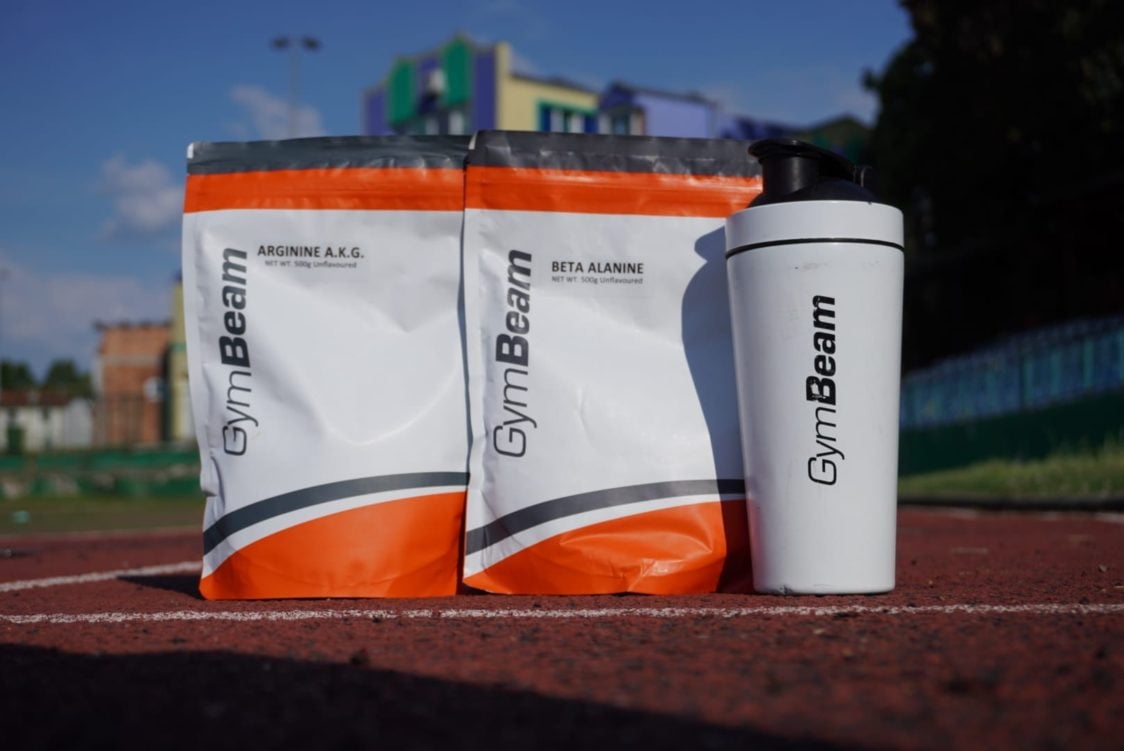
Adaptogens
Adaptogens also play a role in pre-workout stimulants. They are currently the subject of much research, so we can expect to learn more about their effects. But they are already being linked to supporting athletic performance, cognitive function, and increased body resilience. However, long-term use is needed for their benefits to take effect. [24]
Rhodiola rosea
Research has confirmed that weekly use of Rhodiola rosea led to a reduction in chronic fatigue.
- Similarly, it has been shown that Rhodiola rosea can shorten reaction time and improve psychomotor test scores. [25-26]
Ginseng (Panax ginseng)
- Studies show that ginseng has the potential to sharpen certain cognitive functions.
- It also helps relieve symptoms of chronic fatigue. [27-28]
Eleutherococcus senticosus
With 8-week supplementation, recreational athletes experienced an increase in endurance capacity and a slight change in metabolism that led to glycogen sparing.
- Some studies suggest that it may help to increase work capacity during prolonged aerobic activity. [29-30]
Ashwagandha (Withania somnifera)
- A study in which respondents took 500 mg of ashwagandha daily for eight weeks showed an increase in speed and strength compared to a group of people who received a placebo.
- Results of meta-analysis show that ashwagandha supplementation led to improved physical performance in healthy women and men compared to placebo.
- Similarly, ashwagandha may also have an effect on cognitive functions such as attention and memory. [31-32]
Want to learn more about the effects of adaptogens? Then you shouldn’t miss our article Adaptogens: Natural Substances that Help Manage Stress.
What is a recommended serving amount of adaptogens?
- Rhodiola rosea – when selecting, choose standardised extracts containing 3% rosavin and 1% salidrosides. Stick to a serving between 60 and 600 mg per day. However, the maximum serving according to legislation is 100 mg of this extract. [51]
- Ginseng – An effective serving ranges from 500-2000 mg of dried powder. Choose high quality extracts that are standardised for their content of active ginsenosides. [50]
- Eleutherococcus senticosus – studies show that servings of 300-1200 mg per day are effective, but you may also see servings of 2-4g per day. Choose quality extracts that are standardised for eleutherosides. [49]
- Ashwagandha – in studies, servings in the range of 300-500 mg were most commonly worked with. When choosing, try to choose quality extracts that are standardised for withanolides. [48]
Creatine
Creatine is another substance that regularly appears in pre-workout supplements. This is probably because it is among the most effective dietary supplements whose effect is scientifically confirmed. However, if you take creatine only once a week in the form of a pre-workout stimulant, you can’t expect any rapid results. For these, long-term supplementation of at least 3-5 g is needed. In case you take creatine every day, its separate supplementation on certain days can be at least partially replaced by a creatine-containing pre-workout.

What effects can creatine supplementation have?
- The main function of creatine is to regenerate ATP, which is a source of instant energy.
- Research confirms that creatine supplementation is highly beneficial for strength athletes or those working on their burst power. In this case, a 10-20% improvement in performance can occur.
- Additionally, research shows that creatine supplementation can help with improving anaerobic threshold and overall body recovery. [33-34]
There may be a slight increase in weight gain when taking creatine. This is due to the increase in intracellular fluid that creatine binds to. Creatine supplementation then increases these stores by a further 20-40%. So there is no need to worry about this phenomenon and be alarmed that you have gained weight because of it. [34-35]
Wondering which creatine to choose? Then our article How to Choose the Best Creatine will help you.
What is a recommended serving amount of creatine?
The ideal serving amount of creatine in the long term is between 3-5 g. You need to take this amount for at least four weeks to feel the changes. At the same time, there is no need to stop taking creatine and you can safely take it for several years. Often in connection with creatine, the so-called saturation phase is mentioned. However, this is not necessary, and it is precisely during this phase that you would increase the likelihood of sudden weight gain.
What about American pre-workout supplements?
Maybe you’ve only heard of them, but maybe someone has offered them to you under the counter and not only at the gym. Yes, we are talking about American pre-workout supplements, which are often considered the most effective.
But why is this so?
The main reason is that they often contain substances that are banned, especially on the European market. US legislation is somewhat looser in this respect, and so there is a greater risk of banned or doping substances appearing in supplements, which may also have a negative effect on health.
- Examples include DMHA or 1,3-DMAA, which are substances that act as very powerful stimulants. A negative side effect, however, can be an increase in blood pressure and heart rate. [36]
- Other substances that are often found in American pre-workouts include higenamine or ephedrine. These are additionally also on the WADA list of doping substances.
- Another problematic substance may be yohimbine, which puts excessive strain on the cardiovascular system.
Apart from the fact that American pre-workout supplements can ruin your start at some races due to their banned substances content, they have other consequences. In addition to the negative impact on heart and cardiovascular health, the risk of dehydration, anxiety symptoms, depression, headaches, sleep problems and other negative feelings increases. And it’s clearly not worth it. [37]
How and when to use a kickstarter?
You should ideally use a pre-workout supplement approximately thirty minutes before your planned activity. If it is in pill or tablet form, just swallow it. Powdered supplements need to be mixed with liquid. Pre-workout supplements in a shot is also practical and can be drunk straight away.
If you have a workout in the morning, you don’t have to worry about using a pre-workout with stimulants. Later in the afternoon and evening, it’s better to reach for a pre-workout without them so that the quality of your sleep doesn’t suffer. If you have never tried a pre-workout stimulant before, you can start with maybe a half serving to see how your body will react.
However, never try a preworkout for the first time before important events such as races or other competitions. If it doesn’t work for you, you might get nauseous and probably won’t be able to perform adequately.
At the same time, try not to take pre-workout supplements before every workout. See it more as a helper on days when you feel really tired and you know it would negatively affect your performance. With overuse, your body could start to build up a tolerance to caffeine, for example, and you would be forced to take increasingly larger doses to feel the desired effect. Then you would need to take a longer break without the pre-workouts to allow your body to get used to being without it.
Which pre-workout supplement is best for both women and men?
We cannot generally recommend that there is one single ultimate pre-workout supplement for women and one for men. Nor do their ingredients profile differ in any fundamental way and are practically the same. However, it is necessary to watch the amount of substances contained. For example, with caffeine, servings of 3-6 mg are usually used before exercise. However, it turns out that even a serving of 2-3 mg should work.
A 60 kg lady who is sensitive to stimulants and doesn’t drink coffee normally will probably take a different amount. A 90 kg man who is used to stimulants and has no problem with them will take a higher dose. This is how you should approach all the substances contained.
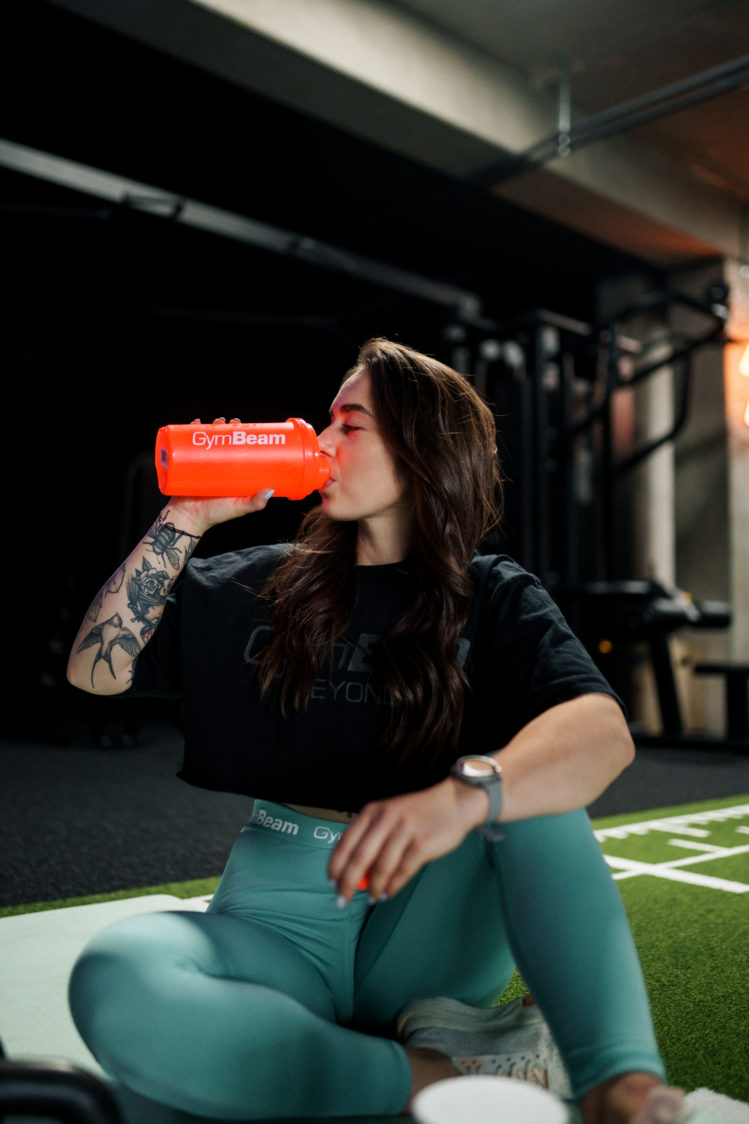
However, if you don’t know which ingredients to reach for in a pre-workout, you definitely won’t go wrong with a combination of caffeine, a NO booster like arginine or citrulline malate, and cognitive support ingredients. These include adaptogens or acetyl l-carnitine, for example.
What would the foundation of an ideal kickstarter look like?
- The foundation of an ideal pre-workout would undoubtedly be the stimulant caffeine, whether in the form of caffeine anhydrous or caffeine from plant sources.
- Another active ingredient would be the amino acid theanine, which has nootropic properties, acts synergistically with caffeine and suppresses its sharp surges and dips.
- The ingredients profile would then be supplemented with NO boosters such as citrulline malate or AAKG, which would streamline the delivery of nutrients to the active muscles.
- And, of course, ingredients to support cognitive performance, such as choline or DMAE, must not be lacking. For this reason, an adaptogen such as Rhodiola rosea could also be included in the formula. This could also help with relief from fatigue.
A pre-workout made from the above ingredients would be a good base for a pre-workout as well as a pre-workout on its own to help you actually get the maximum out of yourself.
And if you’re seeking something like long-term pre-workout supplements to help with improving your overall performance, you can reach for substances that can be taken long-term. Examples of these include creatine or beta alanine.
What should you remember?
After reading this article, it is probably already clear to you that a pre-workout stimulant can be a great helper on days when you feel tired, have no strength, but still want to give your workout your best. However, keep in mind that even pre-workouts aren’t miraculous and won’t do the workout for you, that’s still up to you. Therefore, choose a pre-workout with a suitable ingredients list that will get you pumped up. Consider the use of stimulants, especially in the afternoon or evening, and keep in mind that pre-workouts should not be part of your daily routine.
Do you have someone among your friends who are not familiar with pre-workout supplements and their effect? Share this article with them to make their workouts easier on days when they are low on energy.
[1] Health Benefits of Pre-Workout Supplements – https://www.webmd.com/fitness-exercise/health-benefits-pre-workout-supplements
[2] Joaquim A Ribeiro, Ana M Sebastião – Caffeine and adenosine https://pubmed.ncbi.nlm.nih.gov/20164566/ ]
[3] Nanci S Guest et al. – International society of sports nutrition position stand: caffeine and exercise performance – https://pubmed.ncbi.nlm.nih.gov/33388079/
[4] Michal Wilk et al. – Acute Caffeine Intake Enhances Mean Power Output and Bar Velocity during the Bench Press Throw in Athletes Habituated to Caffeine – https://pubmed.ncbi.nlm.nih.gov/32033103/
[5] Kyle Southward et al. – The Effect of Acute Caffeine Ingestion on Endurance Performance: A Systematic Review and Meta-Analysis – https://pubmed.ncbi.nlm.nih.gov/29876876/
[6] Jason L Talanian et al. – Low and moderate doses of caffeine late in exercise improve performance in trained cyclists – https://pubmed.ncbi.nlm.nih.gov/27426699/
[7] Jozo Grgic et al. – Effects of caffeine intake on muscle strength and power: a systematic review and meta-analysis – https://www.tandfonline.com/doi/full/10.1186/s12970-018-0216-0
[8] Theacrine – https://examine.com/supplements/theacrine/
[9] Betaine – https://examine.com/supplements/betaine/
[10] 1Stephen J Bailey et al. – Acute L-arginine supplementation reduces the O2 cost of moderate-intensity exercise and enhances high-intensity exercise tolerance – https://pubmed.ncbi.nlm.nih.gov/20724562/
[11] D Bendahan et al. – Citrulline/malate promotes aerobic energy production in human exercising muscle – https://pubmed.ncbi.nlm.nih.gov/12145119/
[12] Pérez-Guisado, Joaquín et al. – Citrulline Malate Enhances Athletic Anaerobic Performance and Relieves Muscle Soreness – https://journals.lww.com/nsca-jscr/Fulltext/2010/05000/Citrulline_Malate_Enhances_Athletic_Anaerobic.9.aspx
[13] M A Giamberardino et al. – Effects of prolonged L-carnitine administration on delayed muscle pain and CK release after eccentric effort – https://pubmed.ncbi.nlm.nih.gov/8858401/
[14] L-Carnitine – https://examine.com/supplements/carnitine/
[15] Acetyl-L-Carnitine – Uses, Side Effects, And More – https://www.webmd.com/vitamins/ai/ingredientmono-834/acetyl-l-carnitine
[16] Everything you need to know about choline – https://www.medicalnewstoday.com/articles/327117
[17] DMAE – https://examine.com/supplements/dmae/
[18] Jennifer A. Kurtz et al. – Taurine in sports and exercise – https://www.ncbi.nlm.nih.gov/pmc/articles/PMC8152067/
[19] Thomas G Balshaw et al. – The effect of acute taurine ingestion on 3-km running performance in trained middle-distance runners – https://pubmed.ncbi.nlm.nih.gov/22855206/
[20] Audrey Baguet et al. – Carnosine loading and washout in human skeletal muscles – https://pubmed.ncbi.nlm.nih.gov/19131472/
[21] Beta-Alanine – https://examine.com/supplements/beta-alanine/
[22] Bryan Saunders et al. – β-alanine supplementation to improve exercise capacity and performance: a systematic review and meta-analysis – https://pubmed.ncbi.nlm.nih.gov/27797728/
[23] Qin Liu et al. – Mechanisms of Itch Evoked by β-Alanine – https://www.ncbi.nlm.nih.gov/pmc/articles/PMC3491570/
[24] Adaptogen – https://examine.com/supplements/adaptogen/
[25] Ewa Jówko et al. – Effects of Rhodiola rosea supplementation on mental performance, physical capacity, and oxidative stress biomarkers in healthy men – https://www.ncbi.nlm.nih.gov/pmc/articles/PMC6230218/
[26] Yevgeniya Lekomtseva et al. – Rhodiola rosea in Subjects with Prolonged or Chronic Fatigue Symptoms: Results of an Open-Label Clinical Trial – https://pubmed.ncbi.nlm.nih.gov/28219059/
[27] Md. Jakaria et al. – Active ginseng components in cognitive impairment: Therapeutic potential and prospects for delivery and clinical study – https://www.ncbi.nlm.nih.gov/pmc/articles/PMC6173364/#:~:text=ginseng%20had%20a%20cognitive-enhancing,the%20placebo%20group%20%5B133%5D
[28] Hyeong-Geug Kim et al. – Antifatigue effects of Panax ginseng C.A. Meyer: a randomised, double-blind, placebo-controlled trial [https://pubmed.ncbi.nlm.nih.gov/23613825/
[29] Eleuthero – https://examine.com/supplements/eleuthero/
[30] Jip Kuo et al. – The effect of eight weeks of supplementation with Eleutherococcus senticosus on endurance capacity and metabolism in human – https://pubmed.ncbi.nlm.nih.gov/21793317/
[31] Qin Xiang Ng et al. – A systematic review of the clinical use of Withania somnifera (Ashwagandha) to ameliorate cognitive dysfunction – https://pubmed.ncbi.nlm.nih.gov/31742775/
[32] Diego A. Bonilla et al. – Effects of Ashwagandha (Withania somnifera) on Physical Performance: Systematic Review and Bayesian Meta-Analysis – https://www.ncbi.nlm.nih.gov/pmc/articles/PMC8006238/
[33] Thomas W Buford et al. – International Society of Sports Nutrition position stand: creatine supplementation and exercise – https://www.tandfonline.com/doi/full/10.1186/1550-2783-4-6
[34] Richard B. Kreider et al. – International Society of Sports Nutrition position stand: safety and efficacy of creatine supplementation in exercise, sport, and medicine – https://jissn.biomedcentral.com/articles/10.1186/s12970-017-0173-z
[35] Creatine – https://examine.com/supplements/creatine/
[36] Brian K Schilling et al. – Physiological and pharmacokinetic effects of oral 1,3-dimethylamylamine administration in men – https://www.ncbi.nlm.nih.gov/pmc/articles/PMC3852303/
[37] EPHEDRINE SIDE EFFECTS CENTER – https://www.rxlist.com/ephedrine-side-effects-drug-center.htm
[38] Caffeine – https://examine.com/supplements/caffeine/
[39] Eric A. Newsholme et al. – Branched-Chain Amino Acids and Central Fatigue [https://academic.oup.com/jn/article/136/1/274S/4664137
[40] Vilikus et al. – Výživa sportovců a sportovní výkon – https://obalky.kosmas.cz/ArticleFiles/213072/auto_preview.pdf/FILE/vyziva-sportovcu-a-sportovni-vykon-auto_preview.pdf
[41] Citrulline – https://examine.com/supplements/citrulline/
[42] Arginine – https://examine.com/supplements/arginine/
[43] Betaine – https://examine.com/supplements/betaine/
[44] Choline – https://examine.com/supplements/choline/
[45] DMAE – https://nootropicsexpert.com/dmae/#dmae-dosage
[46] Taurine – https://examine.com/supplements/taurine/
[47] Beta-Alanine – https://examine.com/supplements/beta-alanine/
[48] Ashwagandha Uses, Benefits & Dosage—Herbal Database – https://www.drugs.com/npp/ashwagandha.html
[49] Eleutherococcus senticosus Research Analysis. – https://examine.com/supplements/eleutherococcus-senticosus/
[50] Panax ginseng Research Analysis. – https://examine.com/supplements/panax-ginseng/research/
[51] Rhodiola Rosea Research Analysis – https://examine.com/supplements/rhodiola-rosea/

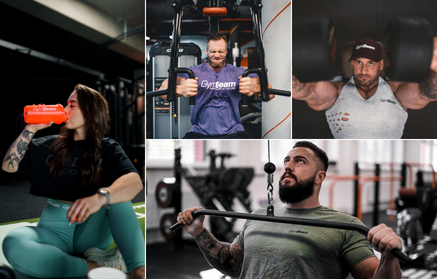
Add a comment